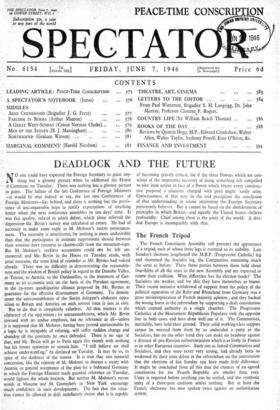DEADLOCIc AND THE FUTURE
1\T0 one could have expected the Foreign Secretary to paint any- 11 thing but a gloomy picture when he addressed the House of Commons on Tuesday. There was nothing but a gloomy picture to paint. The failure of the last Conference of Foreign Ministers —it would be true indeed to say, the last two Conferences of Foreign Ministers—lies behind, and there is nothing but the persis- tence of unconquerable hope to justify expectations of anything better when the next conference assembles in ten days' time. It was this quality, refusal to admit defeat, which alone relieved the depressiore Mr. Bevin's survey was calculated to create. He had of necessity to make some reply to M. Molotov's recent pronounce- ment. The necessity is unwelcome, for nothing is more undesirable than that the participants in intimate negotiations should between their sessions have recourse to clarion-calls from the mountain-tops. But M. Molotov's reckless accusations could not be left un- answered, and Mr. Bevin in the House on Tuesday made, with great restraint, the same kind of rejoinder as Mr. Byrnes had voiced already. There was no difficulty in demonstrating the reasonable- ness and the wisdom of British policy in regard to the Danube Valley, to Trieste, to Austria, to the Dardanelles, to the treatment of Ger- many as an economic unit on the basis of the Potsdam agreement, to the 25-years quadripartite alliance proposed by Mr. Byrnes as guarantee for the effective disarmament of Germany. To demon- strate the unreasonableness of the Soviet delegate's obdurate oppo- sition to Britain and America on each several issue is just as easy.
But to do that is completely valueless. All that matters is the obduracy of the opposition ; its unreasonableness, which Mr. Bevin stressed with no undue emphasis, has no relevance at all—unless it is supposed that M. Molotov, having been proved unreasonable by a logic he is incapable of refuting, will suffer sudden change and abandon all the positions he once defended. There is no sign of that, and Mt. Bevin will go to Paris again this month with nothing but his innate optimism to sustain him. " I still believe we shall achieve understanding," he declared on Tuesday. It may be so, in spite of the darkness of the omens. It is true that one material concession, like the consent of M. Molotov to discuss a treaty with Austria, or general acceptance of the plan for a federated Germany to which the Foreign Minister made guarded reference on Tuesday, would lighten the whole horizon. But neither M. Molotov's recent words at Moscow nor M. Gromyko's in New York encourage much confidence in such developments. The fact that the situa- tion cannot be allowed to drift indefinitely means that it is capable
of becoming gravely critical, for if the three Powers which are con- scious of the imperative necessity of doing something felt compelled to take joint action in face of a Power which vetoes every construc- tive proposal a situation charged with peril might easily arise. Consciousness of that may in the end precipitate the conclusion of that understanding' in whose attainment the Foreign Secretary persistently believes. But it cannot be based on the abandonment of principles in which Britain—and equally the United States—believe profoundly. Chief among these is the unity of the world. A divi- ded Europe is incompatible with that.


























